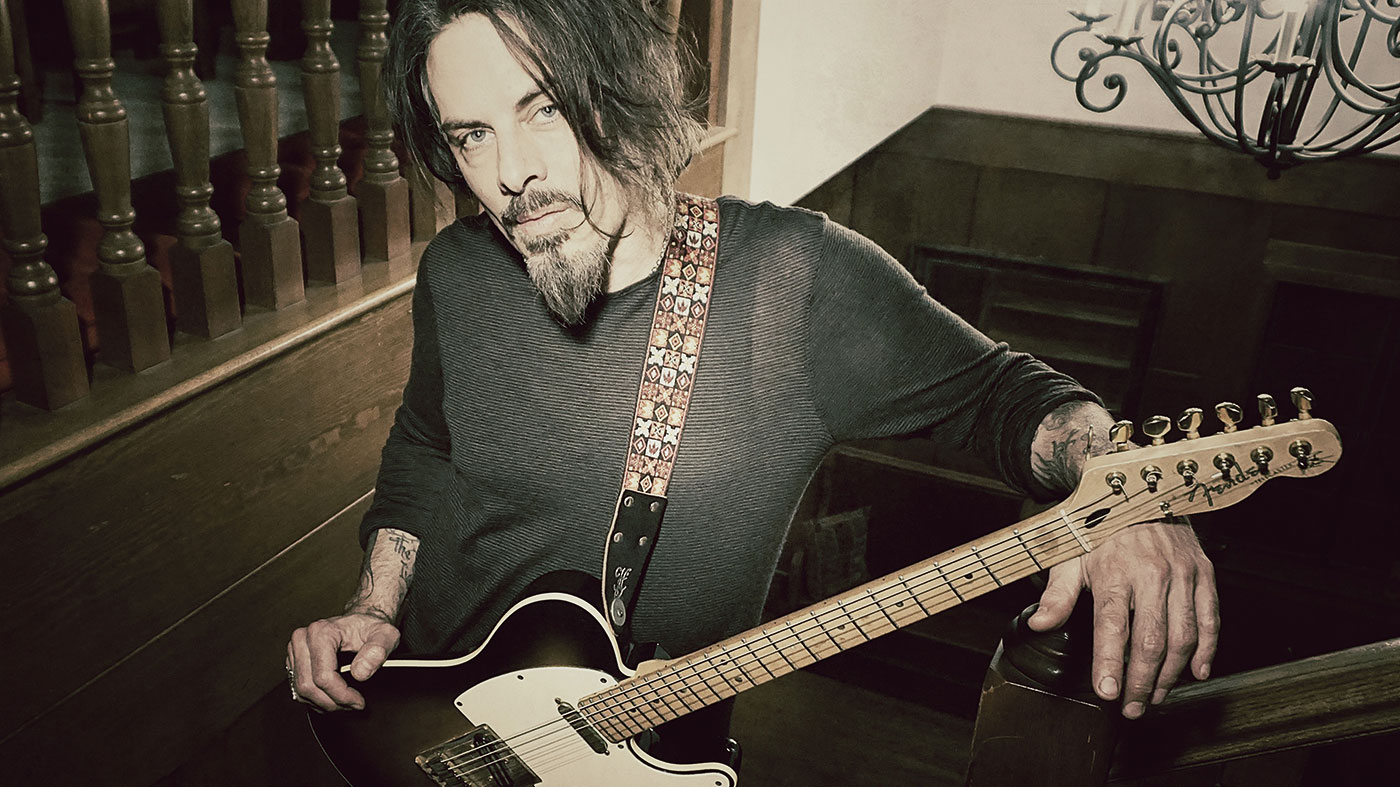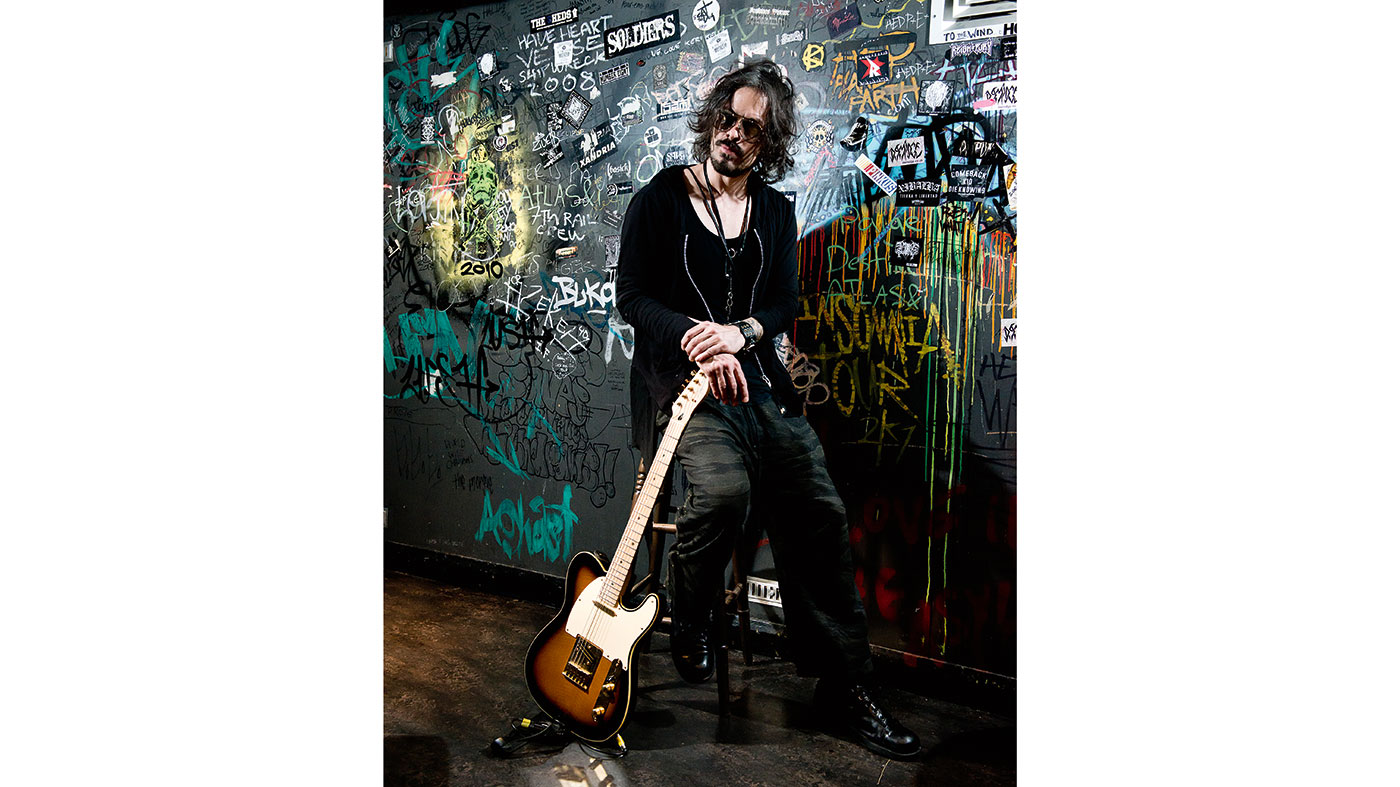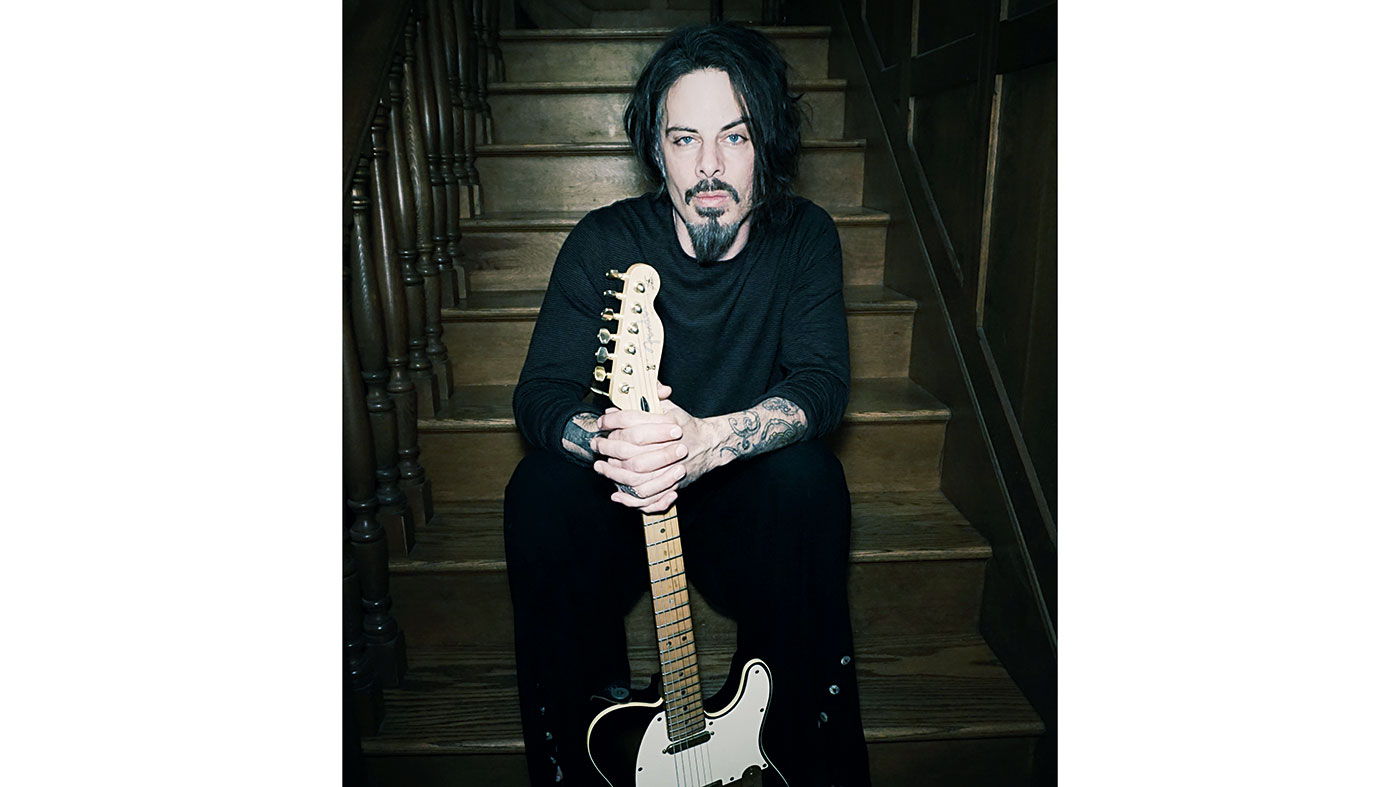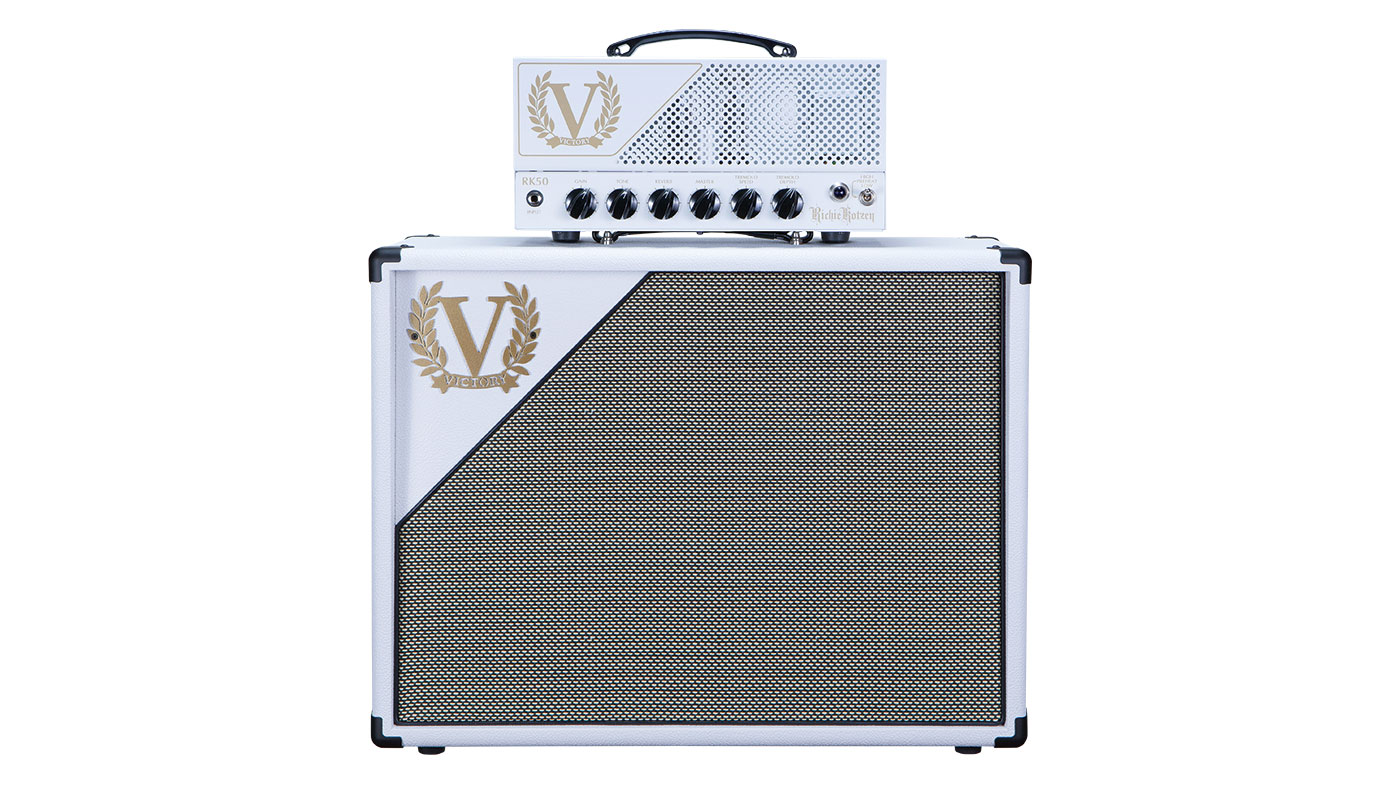Richie Kotzen: “You should be able to solo in any key, major or minor, if you plan on playing music”
The guitar guru shares his thoughts on lead work, legato and what's lacking in many players

Want all the hottest music and gear news, reviews, deals, features and more, direct to your inbox? Sign up here.
You are now subscribed
Your newsletter sign-up was successful
American singer/songwriter and multi-instrumentalist Richie Kotzen walks us through his inimitable guitar style…
There is a level of musicianship that radiates from Richie Kotzen unlike anyone else on this planet. Before you even get to his Prince-rivalling talents as a singer, pianist, drummer or producer - as a guitarist he embodies the very notion of being in tune with his instrument. Like his biggest influences, Jeff Beck, Stevie Ray Vaughan and George Benson, there are no boundaries in between what he hears in his head and the sounds coming out of his amp… it simply pours out of him.
From his early rise as a teenage virtuoso for hire, eventually playing in Mr Big and recording with Stanley Clarke, to his more recent work in The Winery Dogs and, arguably most of all, on his bluesy solo records - it’s always been a case of choice notes for each and every musical moment. Here he tells us how forging his own unorthodox, left-hand path and going against the grain led to sounding brilliantly unique…
Giant steps
Being universally adaptable is the mark of any good musician, believes Kotzen…
“You should be able to solo in any key, major or minor, if you plan on playing music. One thing I’ve noticed, especially in hard rock, there are so many musicians who sound like they’ve only been playing six months when forced outside that one style. It can be like a bull in a china shop... a complete miss!
The key to improvisation is trust. You have to turn all the outside distractions off
“Guitarists can get caught out playing just in A minor or in one blinkered genre and it’s a bit like screaming all the time. I don’t know how musicians can be so great in one way and then suddenly not so much. I’m not saying go from playing rock to playing Giant Steps overnight - there are varying degrees of rock and some people can’t even make that switch.
“I’m not a jazz musician, I can fake a jazz lick real good but I’m not George Benson. Nobody plays guitar like him - nobody. To me, he’s the greatest guitarist that’s ever lived, period. That was the first concert I ever went to as a kid - I saw George at Valley Forge Music Fair, followed by Stevie Wonder the week after! I grew up outside Philadelphia, so there was a lot of R&B and soul on the radio, which is why I have a lot of those kinds of influences.”
Want all the hottest music and gear news, reviews, deals, features and more, direct to your inbox? Sign up here.
Blind faith
How the power of being present holds the key to letting those fingers fly…
“The key to improvisation is trust. You have to turn all the outside distractions off and stop judging what you can and can’t do. It sounds scary but that’s the only way. What makes me listenable as a guitarist, if I am listenable, is my emotional connection to the instrument.
“There are plenty of guitarists that can pick more accurately, or do a lot more technically, and I don’t think my legato is even that sensational - but it’s how everything combines over the right chord changes… that’s when I become interesting. I’m a lot more of an ensemble, in-the-moment player. I’m not the guy to pick up a guitar and dazzle everyone with this intense thing that I worked out, composed over four days and practised until I can play it perfectly. That doesn’t interest me. I’d rather watch someone else do the work and enjoy them doing it.
“Sitting down to practise is the most torturous thing - what excites most of us is the creative process. [The Winery Dogs bassist] Billy Sheehan is the perfect example of a disciplined musician - he can still sit for hours on end and get things perfect. It makes me think I need to fuckin’ practise in order to keep up with him, but I always end up wanting to watch basketball or do something else.
“I put a lot of time in as a child to learn all the techniques - so as a teenager and adult, it was just about what I can create. I just bought a new house, I’m creating here too - having a blast moving walls and changing floors. That’s the fun bit, I guess!”

Songs in the key of life
It doesn’t matter how you layer things, there needs to be something beneath it
“My songs can usually be boiled down to just one acoustic guitar. I think that needs to be true for any song, not just my music. People are very accustomed to hearing pieces that are really produced, especially in modern popular music. You get all these weird sounds and trends with some guy yelling in the background randomly but kind of in time. They do all kinds of shit on these pop records. To me, it sounds distracting but I guess someone must like it. The reality is, if you strip away all of that stuff , what do you have?
Boil down bigger productions to just guitar with voice, you’ll either be like, ‘Wow, there really is a song in there’ or find not much at all
“When you hear bigger productions and boil them down to just guitar or piano with voice, you’ll either be like, ‘Wow, there really is a song in there’ or find not much at all. In my live show, we have a section where we break it down to acoustics or I might go out and play a few songs by myself.
“Some places I’ve played, they put a sub-woofer under the stage, which creates all kinds of nightmares... it’s just a horrible sound. So sometimes, it’s nice to turn all the shit off and just deliver the song. I tend to sing better when it’s just me and the guitar - I can hear better.”
Wonderful slippery thing
The legato master on why he ended up being a left-hand dominant player…
“It just so happened that it was easier for me to do the left hand stuff. The lines I play have an element of picking with my thumb and first two fingers, but inside and around it there are legato elements where I’m hammering notes on, sliding or pulling off - so it tends to be a combination of things.
“I can alternate pick, but I always liked the sound of the more slippery, snakey style of phrasing. I guess I got it from Allan Holdsworth - let’s be honest, that was the guy that made me think, ‘Woah! That’s crazy.’ I’d watch Al Di Meola and alternate pickers like that, and think it was great though I felt there were so many players that sounded like that. Obviously, Al was the original!
“Then you had the other guys from Shrapnel Records - who all had wicked right hands, but it didn’t appeal to me to want to sound that way. I was one of those guys that did things naturally and if it was easier for me to widdle around with my left and wave at the girls in the audience, so be it! I did whatever felt right to my hands or right in my head. That’s the best way to play. There’s no one exercise that will give you your sound - only you can find that.”

Around the bend
How Kotzen combines technology and technique to push his songwriting…
“In The Winery Dogs, I wrote a song called I’m No Angel that uses bends against open strings to create an interesting effect. I don’t know why I came up with that, I must have liked the clash - I guess it has a country feel even though it’s not a country lick. The ideas just come: once you get those muscles going and you understand the feeling/approach to doing it, then all you need to do is seize the moment. Work on it right there or develop it later, but at least document it.
I know the difference between feeling music, letting it come through me instinctively, and not
“On my phone, I have a recorder app - that everyone probably has - and right now there are 175 memos recorded. They are all horrible sounding and probably don’t make much sense, but I know what they mean. The ideas that turn into songs are the ones I don’t need to go back for... they will already be in my head. I’m all about the ones that keep coming back, though sometimes I might think there’s a chorus that might match another verse and go back to find it.”
All in the hands
Why the guitarist eventually chose to ditch the pick after years of hybrid picking…
“Playing with just my fingers made me a much better player in the sense that it forced me to think diff erently. Using a pick, I would find myself getting into traps. I know the difference between feeling music, letting it come through me instinctively, and not. There are examples online of live shows where I’ve literally let music run away with me. I know what that feels like and as a performer you want that feeling every time!
“So for whatever reason on one particular tour, I felt really stuck - like I was just going through the motions. I knew I had to do something to snap out of it. The only thing I could conceive was not using a pick, which wasn’t a massive stretch because I often played things with just my hands.
“Immediately, it eliminated all my scale-based sweep picking or tremolo alternate picking... a lot of stuff was suddenly out of the repertoire but I still had to play! It slowed me down and yet I felt more connected with the instrument, which excited me. Then I had to relearn all the stuff I couldn’t do, like the machine-gun picking or sweep arpeggio shapes, I had to work it all out.”

Blow by blow
Listen to the scale inside of you, first and foremost…
“To be honest, I never really think in terms of scales. I tend to relate it more to pentatonic boxes - say if I suddenly got stuck, I would think about those shapes to save me. I would take everything back to blues if I got in trouble and felt like I was out on a limb. I never look at the neck and think of Aeolian or whatever. Playing guitar is more about knowing the right note is only half a step up or down. I know what keys sound like, and I know if I hang out in certain places too long over certain chords, it can go from interesting to wrong.
I never look at the neck and think of Aeolian or whatever. Playing guitar is more about knowing the right note is only half a step up or down
“I don’t know the technical meaning to it all, like the cycle of fifths or triads, 90% of what I do is because I hear it in my head. I’m able to put my hands on the neck to play it at the same time. I hear things and I want to bring them to life, that’s the real meaning of it all to me. Whether I use a double stop or chromatic note, that’s almost an after effect. I’m not sat there thinking I’ll purposefully play a B minor Phrygian scale here - because by the time I’ve processed it, the song will have moved to the next chord. People get way too caught up in that.”
Wired
Having self-produced so many of his albums, Kotzen shares his tips for recording…
“There are many different things that work really well for recording guitar - you just have to figure out what you want it to sound like first. The initial and easiest thing is getting a close direct sound, getting an SM57 in the right spot in front of the speaker cone. Move them around and you’ll find the right spot - a lot of the times if you get the sound right at source, you won’t even need to EQ it.
“Back when I was making The Winery Dogs’ records, I was engineering my own guitars and I chose to have a lot of microphones. One was close, there was a ribbon mic that was pointing downward and created some extra depth when you messed around with the phasing. I had some room mics for a natural reverb, so maybe three more. Those all got recorded separately so we could have options and manipulate them with different panning, which I’d done before. But sometimes all you need is one room mic, just a 58 to open things up at different points of the song. Sometimes I’ll use it with a C414 on a different speaker and blend, but the 57 alone is most often the tone that I love.”

Crosstown traffic
The Richie Kotzen guide to singing and playing at the same time…
“If you listen to my recent single The Damned, it seems pretty easy at first because I’m singing the same thing as the guitar line - but that quickly changes - and right now I can’t sing it and play both at the same time. I get jammed up. What I need to do between now and my next tour is figure out how the fuck to sing and play my own song ha ha! What I’ll do is slow it down, line by line. And sometimes I’ll be literally marching to keep time. You have to dissect it and eventually speed it up, that’s the only way... the only other option is don’t write guitar parts that are impossible to sing over - which is no good!
When you’re in the studio, making a song, take advantage of being able to do whatever the f*** you want
“I’ve had arguments with musicians about writing stuff I might not be able to play live and I always think, ‘I may never do it live - I might be dead when the record comes out!’ And I firmly believe I’m right. When you’re in the studio, making a song, take advantage of being able to do whatever the fuck you want that will be good for the song. Always make the best choices for the song... if that means the guitar part or vocals are harder, find away to learn it and then just figure it out.”
V is for Victory
Richie fills us in on his new signature RK50 amp…
“There were things about the previous amp [Cornford RK100] that I obviously loved. And then there were the things that I guess I outgrew... because it was a big, heavy 100 watt amp with this huge transformer. It wasn’t fun to get around for my crew or techs or even me, if I had to move it!
“I wanted a straightforward combo, so I went back to Martin Kidd, who designed my old signature and was now at Victory, saying I wanted something simple. I don’t like a lot of trinkets and knobs, I just wanted something really easy to deal with, so we created an amp with one tone knob. Which is nothing new, a lot of old Fenders and Marshall were like that…
“So I have that and one gain control, which is boost-able. I tend to set my lead tone so it really screams and sustains, then I turn the boost off - which takes it back to more of a rhythm or subtle lead tone. I can get all the sounds I need by manipulating the volume knob. There are some extra features like reverb and tremolo, which is a Fender thing... this amp sits somewhere in between the Fender/Marshall worlds, with its own kind of high gain. I wanted the percussive snap that old Plexis had, where the sound hits you in the chest with a thud to every note. I think we accomplished that, but with more gain like the old Soldano amps that were popular when I was a kid.”
Amit has been writing for titles like Total Guitar, MusicRadar and Guitar World for over a decade and counts Richie Kotzen, Guthrie Govan and Jeff Beck among his primary influences. He's interviewed everyone from Ozzy Osbourne and Lemmy to Slash and Jimmy Page, and once even traded solos with a member of Slayer on a track released internationally. As a session guitarist, he's played alongside members of Judas Priest and Uriah Heep in London ensemble Metalworks, as well as handling lead guitars for legends like Glen Matlock (Sex Pistols, The Faces) and Stu Hamm (Steve Vai, Joe Satriani, G3).


